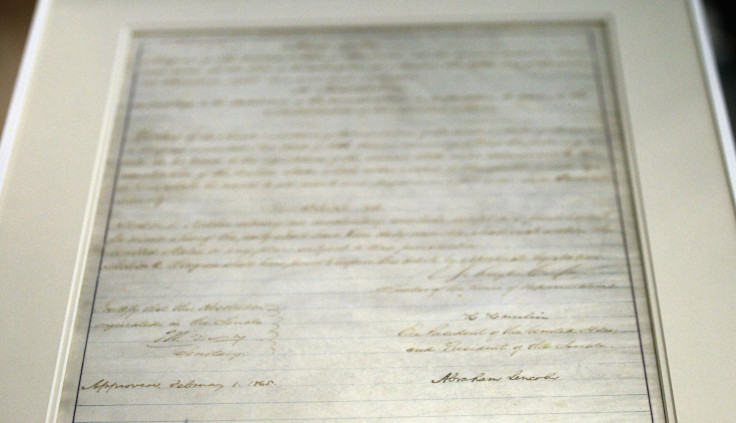13th Amendment To The US Constitution Full Text: Slavery Ban's 150th Anniversary To Be Marked By Lawmakers

U.S. President Barack Obama was due Wednesday to participate in a commemoration of the 150th anniversary of the constitutional amendment banning slavery, but there is one question that lingers about the nation’s involvement in the trans-Atlantic slave trade: Has the U.S. ever apologized to African-Americans for 245 years of enslavement in North America? The answer to that question is complicated, some historians and scholars have said.
Before that question is addressed here, read the full text of the 13th Amendment to the U.S. Constitution:
Amendment XIII
Section 1. Neither slavery nor involuntary servitude, except as a punishment for crime whereof the party shall have been duly convicted, shall exist within the United States, or any place subject to their jurisdiction.
Section 2. Congress shall have power to enforce this article by appropriate legislation.
Today is the 150 th anniversary of the ratification of the 13 th amendment. It basically abolished slavery.
— Reverend Al Sharpton (@TheRevAl) December 6, 2015
The 13th Amendment was passed April 8, 1864, by the U.S. Senate and Jan. 31, 1865, in the House of Representatives through a joint resolution of Congress, according to the National Archives. President Abraham Lincoln signed the resolution Feb. 1, 1865. States ratified it 10 months later, on Dec. 6, 1865. The 14th Amendment, which stipulates that all people born in the United States are citizens, and the 15th Amendment, establishing the right of U.S. citizens to vote regardless of their “race, color or previous condition of servitude,” laid the foundation for later civil rights legislation.
But the country’s leaders have never coalesced around a formal apology for the practice and institution of slavery. In 2008, 143 years after ratification of the 13th Amendment, the House issued an apology to African-Americans for the institution of slavery, including the Jim Crow segregation laws that relegated many blacks to second-class citizenship for nearly 75 years. The following year, the Senate also passed a resolution apologizing for slavery, according to the New York Times.
Those apology resolutions never made it to Obama’s desk for signature because neither chamber could agree on language that would exempt the U.S. from future claims for slavery reparations by black Americans.
© Copyright IBTimes 2025. All rights reserved.






















